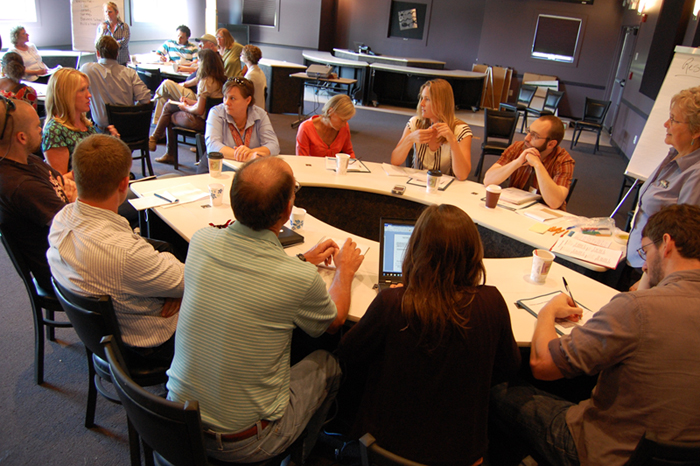Day 1. Social & Networking event (evening)
Day 2. Welcome & Introduction (morning)
Day 2. Guide to Resources (mid-morning)
Day 2. Roundtable Discussions (afternoon)
Day 2. Evening Social (evening)
Day 3. Wrap-up & Reflection (morning)
2012 Seafood Summit
National Summit on Community Supported Fisheries
About the Summit
The National Summit on Community Supported Fisheries brought together a small group of CSF organizers, fishermen, and community leaders (50-75) to explore the challenges and opportunities associated with the emerging model.
Seacoast Science Center, Rye, New Hampshire
Wednesday, May 30 – Friday, June 1, 2012
2012 Summit Format
Background
Community Supported Fisheries (CSFs), loosely based on the Community Supported Agriculture (CSA) model in which consumers pre-pay for a share of fresh local produce from local farmers, have been one approach that fishermen and fishing communities have explored to direct more money to boats, while achieving a range of other social and environmental goals.
Over the last five years CSFs have grown dramatically in number and size on a national scale. If the growth of CSAs is any indicator of the trajectory of CSFs, we can expect that the number of CSFs will continue to multiply. Despite this potential, there are a variety of technical barriers and overarching questions about their long-term viability that have arisen as these programs have matured over the past several years. This spring, we aim to bring together CSFs from across North America to learn from each other.

Objectives
The short-term (6 months to a year)
- Establish a network of fishers and community interests involved with CSFs and related business models;
- Identify opportunities to expand or modify CSF models in existence to broaden their success in relation to economic, social, and ecological goals;
- Deliver information and expertise in areas of immediate need to CSFs including legal considerations and guidelines and best practices related to seafood safety (Resource Guide);
- Identify needs for fishing communities that will enable them to engage more effectively in CSFs;
- Identify the appropriate means for addressing these needs through outreach and extension activities; and
- Establish a network of people engaged in CSF organizational development in fishing communities that can explore an outreach/extension plan subsequent to the meeting.
Long-term (1+ years)
- Long-term objectives of this meeting include improving and enhancing the role of CSFs nationally in achieving goals of supporting fishers, linking consumers with harvesters, supporting ecologically sustainable management, and maintaining fishing community health.
Post-Summit Webinar
- A post-summit webinar covered the highlights from the 2012 National CSF Summit. Meeting organizers presented a summary of the meeting and discussed initial recommendations and next steps.
Summit Sponsors
The Summit was made possible by generous support from:
National Marine Fisheries Service
National Sea Grant Office
Island Institute
New Hampshire Sea Grant
Maine Sea Grant
National Sea Grant Law Center
Northwest Atlantic Marine Alliance
MIT Sea Grant
Planning Committee
Padi Anderson, Director, Granite State Fish
Erik Chapman, Assistant Extension Professor, New Hampshire Sea Grant
Niaz Dorry, Director, Northwest Atlantic Marine Alliance
Madeleine Hall-Arber, Anthropologist, MIT Sea Grant
Amy Scaroni, Program Analyst, National Sea Grant Office
Kim Selkoe, Associate Research Scientist, UC Santa Barbara
Stephanie Showalter Otts, Director, National Sea Grant Law Center
Joshua Stoll, Policy Analyst, National Marine Fisheries Service
Ellen Tyler, unaffiliated, Fish Locally Collaborative